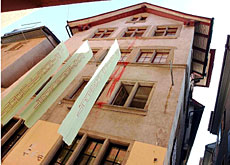Dadaism returns to its roots

Zurich has officially inaugurated a centre dedicated to Dadaism in the former Cabaret Voltaire, birthplace of the controversial art movement in 1916.
This week’s opening ceremony came after years of legal and financial wrangling over the future of the building in the city’s old town.
For many years, the space was occupied by a succession of nightclubs and bars and was later sold to an insurance company which planned to convert it into shops and offices.
In 2002, a group of artists occupied the site and called for it to become a showcase centre for Dadaism.
They were soon evicted, but their protest spurred the city’s parliament to offer a credit package of SFr1.19 million ($870,000) to renovate the building and establish a new home for the subversive art form.
The funds will cover the rent of the building for the next five years.
Cultural heritage
“This part of the world’s cultural heritage will no longer be relegated to the basement of art museums,” said the mayor of Zurich, Elmar Ledergerber, during Wednesday’s opening ceremony.
“We now have a place where we can once again show off the ideas and works of these extraordinary artists.”
The venture is being supported by private sponsors, including the founder of Switzerland’s Swatch Group, Nicolas Hayek, who has pledged to contribute an annual sum of SFr300,000.
“I have always been fascinated by Dadaism,” said Hayek, “because it forces you to think out of frame and makes you throw away the rule book.”
Not everybody is happy about Swatch’s involvement in the project. Artists who fought for the centre’s creation say the city authorities have sold out to commercial interests.
“Dadaism is just a marketing tool for Swatch,” said association member Mark Divo.
Swatch sells a range of Dada-inspired items, and the new centre is decorated with a variety of watches and clocks.
Origins of Dadaism
The Cabaret Voltaire is the place where German poet Hugo Ball and fellow artists founded the Dada movement in 1916.
They revelled in mocking artistic and social conventions of the time and their work emphasised the illogical and the absurd.
The funeral wreath which hangs above the entrance to the new centre – with the message “Dadaism is dead – long live Dadaism” – is proof that the movement is back in business.
The inaugural exhibition, “Dadaize”, pays homage to Japanese photographer Nobuyoshi Araki.
Exhibitions will change every six months, while one of the building’s four rooms will show films of the most important Dada artists.
The centre is also expected to become a place for artists to meet and exchange ideas.
“Since the 1980s, many Swiss artists have referred to Dadaism in their work,” said Juri Steiner, curator of the first exhibition. “We wanted to offer them a space to meet their colleagues and the public and talk about their work.”
Long wait
Steiner criticised the authorities in Zurich for taking so long to give the green light for the project.
“Paris or Rome would never have waited as long as this to put their cultural treasures on show,” he told swissinfo.
Ledergerber admits it has been a long wait, and adds that it will take even longer for the centre to establish itself as an important part of Zurich’s cultural and artistic heritage.
“It will still take some time for the centre to earn its place in the art world,” said the city’s mayor.
The rebirth of Dadaism in Zurich has already led to one unusual competition.
Organisers of the “gugusdada” contest say they will give SFr10,000 to the first parents who dare to give their baby the name Dada.
To be eligible for the prize, the boy or girl must be born next February – the month Dadaism was founded.
swissinfo
Dadaism was based on the principles of irrationality, anarchy, and cynicism, as well as the rejection of laws of beauty and social organisation.
The name of the movement is believed to have come about during a meeting at the Cabaret Voltaire, when a paper knife inserted into a dictionary pointed to the word “dada”.
Dadaism is often seen as a direct response to the First World War raging around neutral Switzerland at the time of the movement’s birth in 1916.

In compliance with the JTI standards
More: SWI swissinfo.ch certified by the Journalism Trust Initiative

You can find an overview of ongoing debates with our journalists here. Please join us!
If you want to start a conversation about a topic raised in this article or want to report factual errors, email us at english@swissinfo.ch.